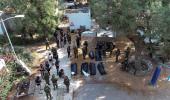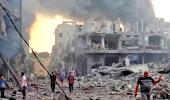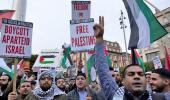External Affairs Minister S Jaishankar on Friday said the October 7 attack on Israel by militant group Hamas was "a big act of terrorism" and is "unacceptable" but there is also an issue of Palestine which must be resolved through dialogue and negotiation.

Addressing the Joint Session of the Senate's External Affairs and Defence Commission in Rome, Jaishankar underlined that international humanitarian law must be respected by everybody.
"What happened on October 7, this big act of terrorism, the subsequent happenings after that, this has taken the entire region into a very different direction...the conflict cannot be the normal of that region, that it comes back to some stability, some cooperation. And within this, we have to find a balance between different issues," he said in response to questions from senators at the session.
Jaishankar said there is no question of if there is an issue of terrorism and reiterated India's position on the resolution of the Israel-Palestine conflict, which is a two-state solution.
"We all find terrorism unacceptable. We have to stand up on purpose. But there is also an issue of Palestine and there has to be a solution...and our view is that it has to be a two-state solution," Jaishankar said.
"If you have to find a solution, you have to find a solution through dialogue and negotiation. You cannot find a solution through conflict and so we would support that as well," he said.
At the same time, the minister said, "We do believe that international humanitarian law must be respected by everybody."
"In any complex situation, it is not wise to not get the balance right. That is a very important part of addressing a very difficult and complicated situation," he said.
Following Hamas's attack on Israel, Prime Minister Narendra Modi last month said that "India strongly and unequivocally condemns terrorism in all its forms and manifestations".
India had also abstained from voting on a UN resolution that called for an immediate humanitarian truce in the Israel-Hamas conflict and unhindered humanitarian access in the Gaza Strip, as it did not make any mention of Hamas.
New Delhi had underscored that terrorism is a "malignancy" and the world should not buy into any justification of terror acts.
Responding to a question on the Indian Ocean region, Jaishankar said, "We are right at the centre of the Indian Ocean. That's why it's called the Indian Ocean. We take that as a responsibility that we see today, whether it's the economy, whether it's maritime security, whether it is natural disasters, whether it is development."
"We are today the fifth largest economy in the world, and we have to contribute more that feeling is very strong there in India. So, from COVID to, I would say, to natural calamities...we have tried to do what we can to stabilise and strengthen the Indian Ocean region," he said.
Speaking on the India-Middle East Corridor (IMEC) launched on the sidelines of the G20 Summit convened by India in September, Jaishankar said, "The fact that we came together for the IMEC initiative was actually proof today that the changes in the Middle East which are taking place, these can become a new method of bringing India and Europe closer."
The Memorandum of Understanding (MoU) for IMEC was signed by India, the US, the United Arab Emirates, Saudi Arabia, France, Germany, Italy, and the European Union.
He also noted that India has a very strong relationship with countries in the Gulf region.
"We have 9 million Indians living in the Gulf. They keep the Gulf economy going. The largest number of Indian citizens outside India, apart from the United States, are in the United Arab Emirates and in Saudi Arabia. So these are very deep relationships," he said.
On BRICS expansion, Jaishankar said, the five-nation bloc has expanded and taken in six new members.
"There was a lot of interest, almost 30 countries wanted to be members of BRICS. And the reason for that is there is today a feeling that the world in a way has diversified beyond just Western countries...it's today possible in the world to be non-West but not anti-West. The two are very different. And I think this is part of the evolving direction of the world where there will be more power centres," he said.
The BRICS bloc -- comprising Brazil, Russia, India, China and South Africa -- in August had agreed to admit Saudi Arabia, Iran, Ethiopia, Egypt, Argentina and the United Arab Emirates, in a move seen as accelerating its push to reshuffle a world order it sees as outdated.











 © 2025
© 2025